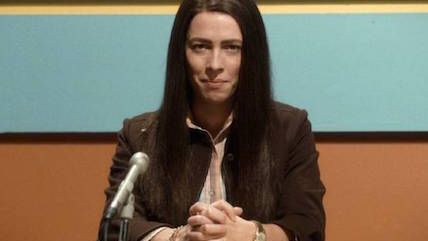Movie Review: Christine
Rebecca Hall is darkly brilliant in a true-life story of death on the airwaves.


Director Antonio Campos's Christine tells the story—or as much of it as possible—of Christine Chubbuck, the first person to commit suicide on live TV. There's no uncertainty about how the movie will end—with a sudden gunshot and a spray of blood—but it doesn't feast on that final scene. The picture's main intent is to probe what little is known about its subject and her sad, conflicted life. This might have been an even grimmer exercise than it is—and be advised, it really is grim—were it not for a carefully detailed script by first-time screenwriter Craig Shilowich and a powerful, self-effacing lead performance by Rebecca Hall, who disappears into the role of an obscurely tormented woman who's disintegrating before our eyes.
Hall's Chubbuck is a person who has never been at home in her own skin. She's slumpy and sardonic, and communicates mostly in sour wisecracks. Her pale face seems to be peering out at us from some terrible murk. The year is 1974, and she's a reporter for a small ABC affiliate in Sarasota, Florida. We can't help noticing that she's not especially distinguished at what she does—her on-camera standups are flat and her early-morning "community news" show, Suncoast Digest, is drably earnest.
But Christine is nevertheless ambitious. She longs to break out of Sarasota and into a bigger market—possibly at a new station that's starting up in Baltimore. Her own station, WXLT, is getting slaughtered in the ratings, and her boss (Tracy Letts) has decreed an editorial pivot toward sex and violence. "We need juicier stories," he says. Christine gives this a shot ("I just need to show the darker side of Sarasota," she decides), but she's not really good at it. The station's news anchor, a lacquered TV natural named George (Michael C. Hall), tries to be her friend, and maybe more; but although Christine has a secret crush on him, she can't muster an emotional response. "I have a lot of work," she says, awkwardly brushing him off.
The movie lays out the few facts that are known about Chubbuck's private life in melancholy procession. She's about to turn 30 and still lives with her mother. She has never had a romantic relationship and is still a virgin. A doctor tells her she needs to have an ovary removed, which could preclude her ever having children. There's also some sort of mental breakdown in her past, and for a while she was on anti-depressant medication, which she has unwisely stopped taking.
Hall is at her complex best in a long scene in which she pays a late-night visit to the home of station owner Bob Anderson (John Cullum), and tries to mute her desperation in pleading for a transfer to the new Baltimore station, which he also owns. (He tells her he has already selected two WXLT staffers for promotion to the big time: news anchor George and a young sports girl, whom George recommended.) And Michael C. Hall, who skillfully sidesteps mere smarminess throughout, manages to march only up to the edge of creepiness in a long sequence in which George finally takes Christine out to dinner—but only to maneuver her afterward into attending a meeting of a cult-like self-actualization group of which he's a member.
The movie is impressive in its willingness to sink deeply into this dark material—even a pair of scenes in a sunny restaurant seem ringed by shadows. But Christine's story, unsurprisingly, lacks depth—she obviously suffers from clinical depression, and that's about it. We can only imagine exactly what drove her to bring a .38-caliber revolver to her final broadcast, along with a script—to be read later by someone else—describing her final act. Hall's performance is richly suggestive, and at this point that may be all that's possible.


Show Comments (58)